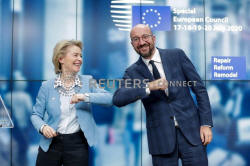EU reaches 'truly historic' deal on pandemic recovery
after fractious summit
 Send a link to a friend
Send a link to a friend
 [July 21, 2020] By
Jan Strupczewski, John Chalmers and Robin Emmott [July 21, 2020] By
Jan Strupczewski, John Chalmers and Robin Emmott
BRUSSELS (Reuters) - European Union leaders
clinched an "historic" deal on a massive stimulus plan for their
coronavirus-throttled economies in the early hours of Tuesday, after a
fractious summit lasting almost five days.
The agreement paves the way for the European Commission, the EU's
executive, to raise billions of euros on capital markets on behalf of
all 27 states, an unprecedented act of solidarity in almost seven
decades of European integration.
Summit chairman Charles Michel called the accord, reached at a 5.15 a.m.
(0315 GMT), "a pivotal moment" for Europe.
Many had warned that a failed summit amid the coronavirus pandemic would
have put the bloc's viability in serious doubt after years of economic
crisis and Britain's recent departure.
European shares rallied to four-month highs on Tuesday and the euro
touched a four-month high of $1.1470. [nL3N2ES1Y2]
"This agreement sends a concrete signal that Europe is a force for
action," a jubilant Michel told reporters.

French President Emmanuel Macron, who spearheaded a push for the deal
with German Chancellor Angela Merkel, hailed it as "truly historic".
Leaders hope the 750 billion euro ($857.33 billion) recovery fund and
its related 1.1 trillion euro 2021-2027 budget will help repair the
continent's deepest recession since World War Two after the coronavirus
outbreak shut down economies.
Germany Economy Minister Peter Altmaier said that, with the agreement,
the chances of "a cautious, slow recovery" in the second half of this
year had increased enormously.
While strong in symbolism, the deal came at the cost of cuts to proposed
investment in climate-friendly funds and did not set conditions for
disbursements to countries, such as Hungary and Poland, seen as
breaching democratic values.
In an unwieldy club of 27, each with veto power, the summit also exposed
faultlines across the bloc that are likely to hinder future
decision-making on money as richer northern countries resisted helping
out the poorer south.
The Netherlands led a group of "frugal" states with Austria, Sweden,
Denmark and Finland, insisting that aid to Italy, Spain and other
Mediterranean countries that took the brunt of the pandemic should be
mainly in loans, not in non-repayable grants.
"There were a few clashes, but that's all part of the game," said Dutch
Prime Minister Mark Rutte, describing a "warm" relationship with his
Italian counterpart, Giuseppe Conte.
[to top of second column] |

European Council President Charles Michel and European Commission
President Ursula Von Der Leyen do an elbow bump at the end of a news
conference following a four-day European summit at the European
Council in Brussels, Belgium, July 21, 2020. Stephanie Lecocq/Pool
via REUTERS

But Austrian Chancellor Sebastian Kurz said the frugals' negotiating power was
here to stay, suggesting Europe's traditional Franco-German engine will be
challenged.
ALMOST A SUMMIT RECORD
Frictions peaked on Sunday night as Macron lost his temper with the frugals,
diplomats said, and Polish Prime Minister Mateusz Morawiecki branded them
"stingy, egotistic states".
The bickering spun the summit out, making it the EU's second-ever longest, just
20 minutes short of a record set in 2000 in Nice, according to Rutte. "We would
have broken the record at 6:05, but we ended at 5.45," he said.
Under the compromise, the Commission will borrow 750 billion euros using its
triple-A debt rating, disbursing 390 billion in grants - less than the
originally targeted 500 billion - and 360 billion in cheap loans.
Given the difficulties, talk of Europe's 'Hamilton' moment - hailed as such by
German Finance Minister Olaf Scholz on Monday in reference to Alexander
Hamilton's decision to federalise debts of U.S. states in 1790 - is overblown.
The summit deal does not set the EU on the path towards a U.S.-style fiscal
union, although some see it as a first step.
Rutte's negotiations won an "emergency brake" to temporarily stop transfers of
money from the recovery fund if an EU state was seen as not meeting reform
conditions tied to the money.
The frugals also secured larger rebates from the next EU budget, a payback
mechanism first won by Britain in the 1980s and which France had hoped to phase
out after Brexit.
The recovery plan now faces a potentially difficult passage through the European
Parliament and it must be ratified by all EU states. The first money will likely
not reach the real economy before the middle of next year, economists say.

($1 = 0.8748 euros)
(Additional reporting by Reuters bureaux, Writing by John Chalmers and Robin
Emmott; Editing by Michael Perry, Jon Boyle and Nick Macfie)
[© 2020 Thomson Reuters. All rights
reserved.] Copyright 2020 Reuters. All rights reserved. This material may not be published,
broadcast, rewritten or redistributed.
Thompson Reuters is solely responsible for this content. |